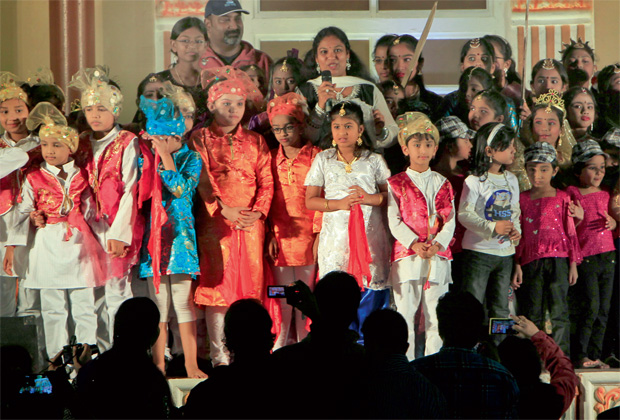
Dubai, Jan 11: Of the many country pavilions in the Global Village, the India Pavilion stands out in terms of size and variety. It is the largest pavilion at the village. Spread across an area of 11,500 square metres, it is popular with both residents and tourists alike.
“The India pavilion presents a kaleidoscopic view of India’s rich tradition and culture not only to multinational visitors but also to fellow Indians,” says Sunil Bhatia, CEO of India Pavilion, E4 Entertainment, a leading events and exhibitions company in Dubai, is the organiser of the pavilion.
“More than trade participation, the pavilion provides a cultural window. It has become one of the biggest retail exhibitions involved in the promotion of Indian culture, tourism, trade and small-scale industries such as handicrafts and handlooms,” adds Bhatia.
The theme state of India this year is Gujarat and the facade of the pavilion is the replica of the Lakshmi Vilas Palace of Vadodara in Gujarat. As you walk inside, you notice a wide variety of Indian products on display at the various stalls. Handicrafts and handloom products from various states in India dominate.
For the home, you have a choice of wrought iron and wooden furniture, cane and bamboo products, cushion covers, wall hangings, rugs, decorative items, clay/terracotta items, home accessories and furnishing, cotton, silk and designer bedspreads, kitchenware, cutlery and mats.
There are table covers, runners, accessories, handmade and machine-made carpets, candle holders, flower vases, paintings, wood and leather jewellery boxes, lamp shades, picture frames, marble and metal decorative items, coir and jute handicrafts, wood carving, coconut shell work, bidri craft, blue pottery, foot mats, silk painting, canvas, jute and leather bags, pouches and clutches.
There are different types of fabrics and fashion accessories for women. You have a choice of chaniya choli/lehenga choli (bridal wear), salwar suits, saris, tops, kurtis and skirts made of crochets. There is a selection of matching Jaipuri and Punjabi jutties. Besides fashion jewellery, there is a selection of real gold and diamond jewellery.
India is fast emerging as a medical excellence centre and attracts international travellers in large numbers. The allure is endless… be it ayurveda, yoga, meditation, rejuvenating spas, or high-tech healing. At the India Pavilion, there is a selection of ayurvedic and herbal products, Indian spices and packed ethnic foodstuff. Hair accessories and hair treatment products, healthcare products, gems, zodiac stones and vastu-related items also stoke the interest of curious visitors.
Performers at the pavilion continue to charm visitors. The India Pavilion is the only one that has its own stage with a seating capacity of 800. There are cultural programmes six days a week, held in the evening, for two to three hours during which performers from various states of India showcase traditional, cultural and Bollywood dances. Street performers and puppeteers from Rajasthan add to the attraction.
“The puppet show from Rajasthan is a big hit. Tribes of Rajasthan have been performing this art from ancient times and it has become an eternal part of Rajasthani culture and tradition. Demo artists have been specially flown down from India and show live demonstrations of their craft at a specially constructed ‘Handicrafts Hut’ and their skill at henna design is a real crowd-puller at the pavilion,” says Bhatia.
Children, especially the little ones, can experience the miniature merry-go-rounds specially brought in from India to ensure that kids here do not miss out on traditional fun.
Bhatia adds: “The success of earlier editions has encouraged us to increase not only the size of the pavilion but also the space between stalls. This will enable visitors to enjoy more walking space and reduce congestion in the pavilion, considering the favourable results it has achieved.
“Keeping in mind the past sales records, exhibitors will find the extensive promotion, immense popularity and convenient location ideal for the promotion of Indian products, particularly those interested in entering the market for the first time. The Global Village is an attractive retail location and known to have the highest sales of any shopping venue during the Dubai Shopping Festival.”





Comments
Add new comment